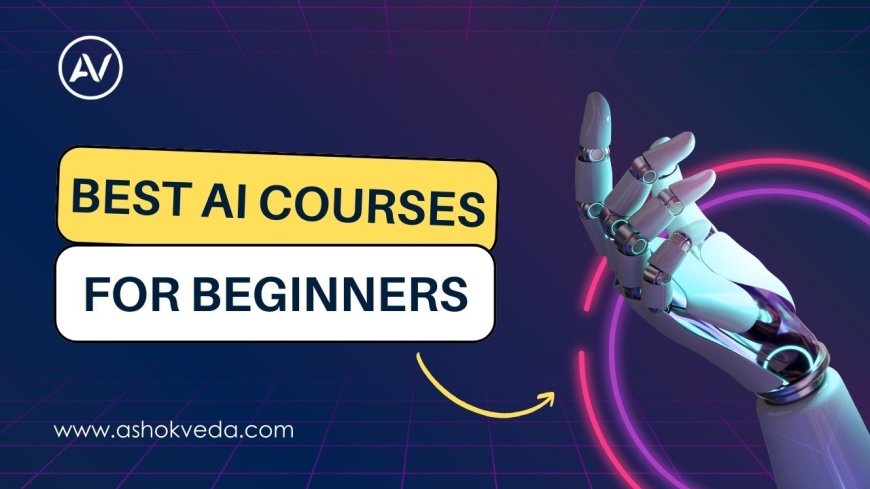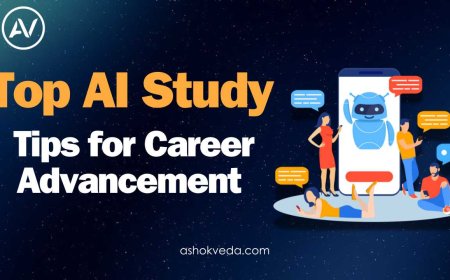Best AI Courses for Beginners
Discover top AI courses for beginners. Explore beginner-friendly AI courses online, machine learning basics, AI tutorials, learn Python, data science.

Beginning your journey into the field of artificial intelligence (AI) can be exciting, with numerous courses available to assist beginners in understanding the principles of this disruptive technology. For those new to the area, selecting the correct course can lay the groundwork for a successful career in AI. We'll look at the best AI courses for beginners, highlighting essential features and explaining how they can help you get started with machine learning, neural networks, and other topics.
It might be difficult to get through the huge amount of AI tutorials and courses accessible. It is critical to select programs that not only address fundamental AI ideas but also provide practical experience through projects and case studies. These courses are designed to be user-friendly, with step-by-step instructions to guarantee that even those with less technical knowledge can build confidence in applying AI tools and approaches.
AI is rapidly transforming our society, from personal assistants like Siri to self-driving cars and improved medical diagnostics. Choosing the correct AI course is critical for beginners looking to learn more about this interesting topic. Not only does it get you started in AI, but it also lays the groundwork for future study and career options.
Best AI Courses
Introduction to Artificial Intelligence
This basic course introduces students to core AI principles, methods, and applications, including supervised and unsupervised learning, neural networks, and ethical implications in AI.
Machine Learning for Beginners
This course is designed for beginners and includes a complete review of machine learning techniques such as regression, classification, clustering, and dimensionality reduction, as well as hands-on coding activities in Python.
Deep Learning Fundamentals
Explore the intriguing world of deep learning by investigating neural network topologies, convolutional neural networks (CNNs), recurrent neural networks (RNNs), and advanced subjects such as generative adversarial networks (GANs) and reinforcement learning.
Natural Language Processing (NLP) Basics
Learn the principles of natural language processing (NLP), including text preparation, feature extraction, sentiment analysis, named entity recognition (NER), and text generation, with applications in chatbots, language translation, and information retrieval.
Computer Vision Essentials
With hands-on projects utilizing popular libraries such as OpenCV and TensorFlow, you can learn the secrets of computer vision, including picture classification, object detection, image segmentation, and facial recognition algorithms.
Ethics and Responsible AI
Investigate the ethical aspects of AI technology, including prejudice, fairness, transparency, privacy, and responsibility, and discover how to create AI systems that emphasize ethical considerations and social impact.
Factors to Consider When Choosing an AI Course
-
Learning Objectives: Before enrolling in an AI course, beginners should specify their learning goals, such as mastering machine learning algorithms, understanding neural networks, or applying AI concepts to real-world issues.
-
Course Content and Structure: The course's content and organization have a significant impact on its effectiveness. Beginners should look for courses that provide a thorough understanding of AI concepts, hands-on projects, and possibilities for practical application.
-
Instructor Experience and Teaching Style: The instructor's skills and teaching style have a considerable impact on the learning experience. Beginners should look for classes taught by experienced professionals who can explain complex ideas understandably and interestingly.
-
Prerequisites & Difficulty Level: AI courses have varying prerequisites and difficulty levels. Beginners should select classes that are appropriate for their present knowledge and skill level, whether they are complete beginners or have some programming and mathematical background.
-
Reviews and testimonials: Reading reviews and testimonies from previous students can provide vital information about the course's quality, teaching techniques, and overall learning experience.
How can beginners stay updated with the latest advancements in AI?
Keeping up with the newest breakthroughs in AI may be both thrilling and overwhelming for beginners. Reading credible blogs and articles daily is an efficient method to get started. Websites such as Towards Data Science, Synced, and the AI section of MIT Technology Review provide easily available articles that explain recent advances and trends in the industry. These platforms frequently simplify complex topics into more understandable content, making them great for beginners.
Another effective strategy is to participate in online classes and webinars. Coursera, edX, and Udacity provide courses designed by AI specialists that range from basic to advanced. These courses are continually updated to reflect the most recent trends and technologies. Furthermore, many universities and technology businesses host webinars and free lecture series on platforms such as YouTube, where top experts discuss their most recent findings and perspectives.
Participating in community forums and social media groups can be extremely beneficial. Websites like Stack Overflow, Reddit's r/MachineLearning community, and LinkedIn groups provide forums for discussing AI subjects, asking questions, and receiving comments from peers and experts alike. These groups routinely post links to recent studies, tools, and software changes, keeping their members informed of the latest in AI.
Is hands-on experience essential for learning AI?
Hands-on experience is extremely advantageous for learning artificial intelligence (AI) and should be considered essential for various reasons. First, AI comprises a wide spectrum of difficult and technological concepts that substantially benefit from actual application. Students can observe theory in action by working directly with tools such as TensorFlow, PyTorch, and various machine learning methods. This exposure helps to reinforce understanding by allowing learners to interact with data, adjust model parameters, and see the results in real-time. Furthermore, practical work helps to develop problem-solving skills, which are required for tackling the particular obstacles given by AI projects such as data pretreatment, model selection, and tuning.
Furthermore, the AI sector is rapidly expanding, necessitating a hands-on approach to stay current with new technologies and approaches. Working on projects and real-world data sets provides experience that is frequently sought by employers in the technology sector. It bridges the gap between academic knowledge and real-world application, increasing learners' competitiveness and competence. Working directly with AI tools and datasets inspires new ideas and approaches, which promotes creativity.
The hands-on experience encourages better engagement and retention of information. Active participation in model creation, training, and testing increases learners' understanding and memory of the processes involved. It also enables individualized learning by allowing users to focus on specific areas of interest or problems. To summarize, while theoretical understanding is vital, hands-on experience is required to master AI and fully realize its potential in practical circumstances.
As a beginner, learning AI can be both exciting and gratifying, thanks to the abundance of courses and resources available to help you along the way. By choosing the finest AI courses based on your interests, goals, and learning style, you may gain the information and skills required to prosper in the ever-changing field of artificial intelligence.




































